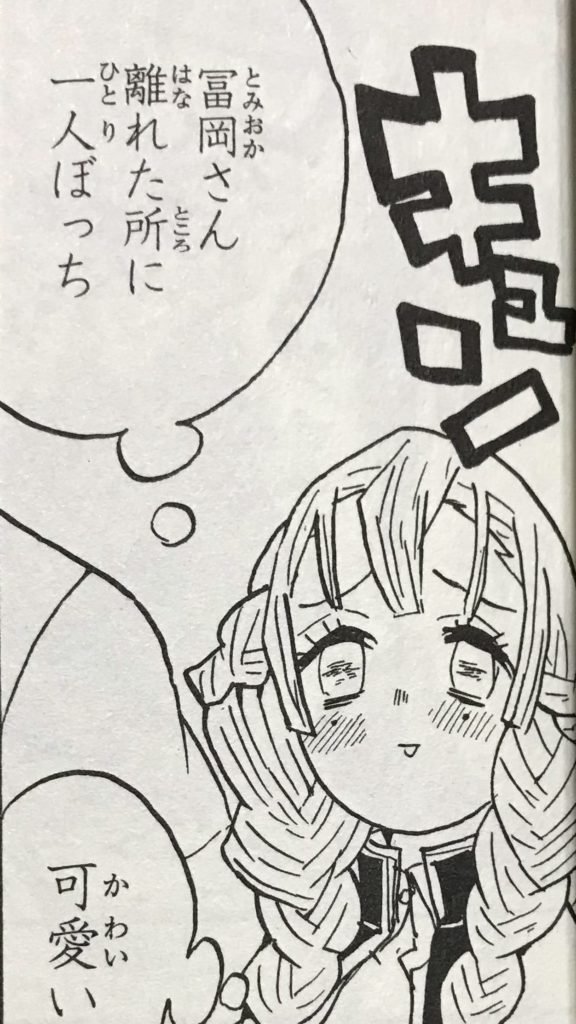Welcome to Kimetsu no Japanese, a site for learning Japanese from a manga Demon Slayer.
Today’s topic
Ch.45 Vol.6
Mitsuri Kanroji (甘露寺 蜜璃)
Reference source : 五峠呼世晴 (2017) 鬼滅の刃6 集英社
富岡さん 離れた所に 一人ぼっち 可愛い
Tomioka is all alone – keeping his distance. Adorable!
Reference source : KOYOHARU GOTOUGE. (2019). Demon Slayer. VIZ Media, LL

Mitsuri’s love series, vol 2! When she saw Giyu Tomioka standing at a distance from other members, she thought he’s adorable! Maybe she can fall in love with anyone and in any situation.
Lesson
| JPN | 富岡さん / 離れた所に / 一人ぼっち / 可愛い |
| JPN♪ | Tomioka-san / hanareta tokoro ni / hitori bocchi / kawaii |
| ENG | Mr.Tomioka, he is all alone at a distance from us, how adorable |
| WORD | JPN♪ | MEANING |
|---|---|---|
| 富岡さん | tomioka-san | san = Mr. or Ms. |
| 離れた | hanareta | at a distance, away |
| 所に | tokoro ni | at a place, 所 : a place, に<particle> |
| 一人ぼっち | hitoribocchi | a state of social isolation, aloneness |
| 可愛い | kawaii | adorable, cute |
Explanation1 | Honorific titles
Mitsuri, Shinobu, Tanjiro and Zenitsu, when they call someone’s name (especially hashira and elder people), they always put “san” after the name which means Mr. or Ms.. In English manga version, they don’t put Mr./Ms., but please remember they always polite when calling names.
Major honorific titles
| WORD | JPN♪ | MEANING |
|---|---|---|
| さん | san | Mr. or Ms. Most orthodox title that you can use for anyone. |
| 様 | sama | “Sama” means Mr. or Ms. but more polite than “san”. |
| 君 | kun | Used for boys / men. Sometimes used for women but it’s rare. |
| ちゃん | chan | Used for kids and girls but also for adults in a friendly manor. *Nezuko and Tanjiro’s younger brothers and sisters call Tanjiro as “Ni-chan”which means “big brother + chan”. For elder sister, call “Ne-chan” |
Tanjiro always put “san” to anyone other than his friends. (He is very polite!)
But.. he calls “Tokito-kun” for Muichiro. Tanjiro uses “kun” for Muichiro because Muichiro is younger than Tanjiro, maybe.
Zenitsu calls Nezuko “Nezuko-chan”.
Inosuke never puts honorific titles to anyone even seniors or hashira. He has no sense of hierarchical relationship.
Shinobu Kocho calls Tanjiro “Tanjiro-kun”, which shows a feeling of friendliness.
Explanation2 | hitori bocchi
Hitoribocchi, this word is used very often in our conversation. Here the Kanji for “Hitori” is 一人 which means “one person”, but another kanji is also used 独り meaning “alone”. So this word expresses a situation of loneliness.
We also use a slang “ぼっち (bocchi)” for a solicited situation.
Words using “Hitori”
“独り言(hitori goto)” Self-talking
“独り旅(hitori tabi)” Traveling by oneself
“独り飯(hitori meshi)” Eating with nobody
“独り占め(hitori jime)” Taking something all for oneself
That’s all
Hitoribocchi (ひとりぼっち) sounds very miserable but a person even in this situation looks adorable to Mitsuri! She’s a very positive person and it’s a good way of thinking to live happily.
Recently people enjoy “Hitori” time. It’s nice to enjoy with people but it’s also good to have a time only for oneself. But I think Giyu should have more time with other people, he’s too hitoribocchi!


Comment